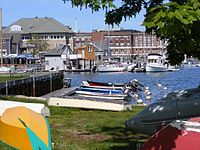Marine Biological Laboratory
 |
|
 |
|
| Established | 1888 |
|---|---|
| Research type | Pure and applied research |
|
Field of research
|
biology, ecology, climate change, physiology, neuroscience, Sensory systems, microbiology, microbial ecology, genomics, aquaculture, tissue engineering, regeneration, informatics, biodiversity informatics |
| Director | Huntington Willard |
| Address | 7 MBL Street |
| Location |
Woods Hole, Massachusetts, United States 41°31′34.40″N 70°40′22.40″W / 41.5262222°N 70.6728889°WCoordinates: 41°31′34.40″N 70°40′22.40″W / 41.5262222°N 70.6728889°W |
|
Zip code
|
02543-1015 |
| Nickname | MBL |
| Affiliations | University of Chicago |
| Website | www |
The Marine Biological Laboratory (MBL) is an international center for research and education in biology, biomedicine, and environmental science. Founded in Woods Hole, Massachusetts in 1888, the MBL is a private, nonprofit institution affiliated with the University of Chicago. After being independent for most of its history, it became affiliated with the university in 2013. It also collaborates with other institutions, including Brown University, the Woods Hole Oceanographic Institution, and the Woods Hole Research Center.
The MBL has approximately 300 year-round employees, about half of which are scientists and scientific support staff. They are joined each year by more than 300 visiting scientists, summer staff, and research associates from hundreds of institutions around the world, who conduct research in the Whitman Center for Visiting Research (MBL Facts).
During the summer, more than 1,400 students and faculty from around the world come to the MBL to participate in the laboratory's graduate-level courses, including Neurobiology, Microbial Diversity, Frontiers in Reproduction, and Biology of Parasitism. Some of these courses (Physiology, Embryology, and Neural Systems and Behavior, formerly called Invertebrate Zoology) have been offered for more than a century (MBL Facts).
The MBL's three main resident research centers are The Ecosystems Center, The Bay Paul Center for Comparative Molecular Biology and Evolution, and the Eugene Bell Center for Regenerative Biology and Tissue Engineering (MBL Facts).
The MBL and Brown University share a research and educational affiliation. However, the Brown-MBL Partnership, which included a Ph.D.-awarding Graduate Program in Biological and Environmental Sciences, has ended. Other MBL programs train postgraduates, undergraduates, science teachers, historians, and science journalists. Throughout the year, the MBL is the site for research and planning conferences organized by professional scientific groups (MBL Facts).
The MBL shares a library, the MBLWHOI Library, with Woods Hole Oceanographic Institution. The MBLWHOI Library holds print and electronic collections in the biological, biomedical, ecological, and oceanographic sciences, and houses a growing archival collection, including photograph and videos from the MBL's 120-year history. The library also conducts digitization and informatics projects (MBL Facts).
...
Wikipedia
